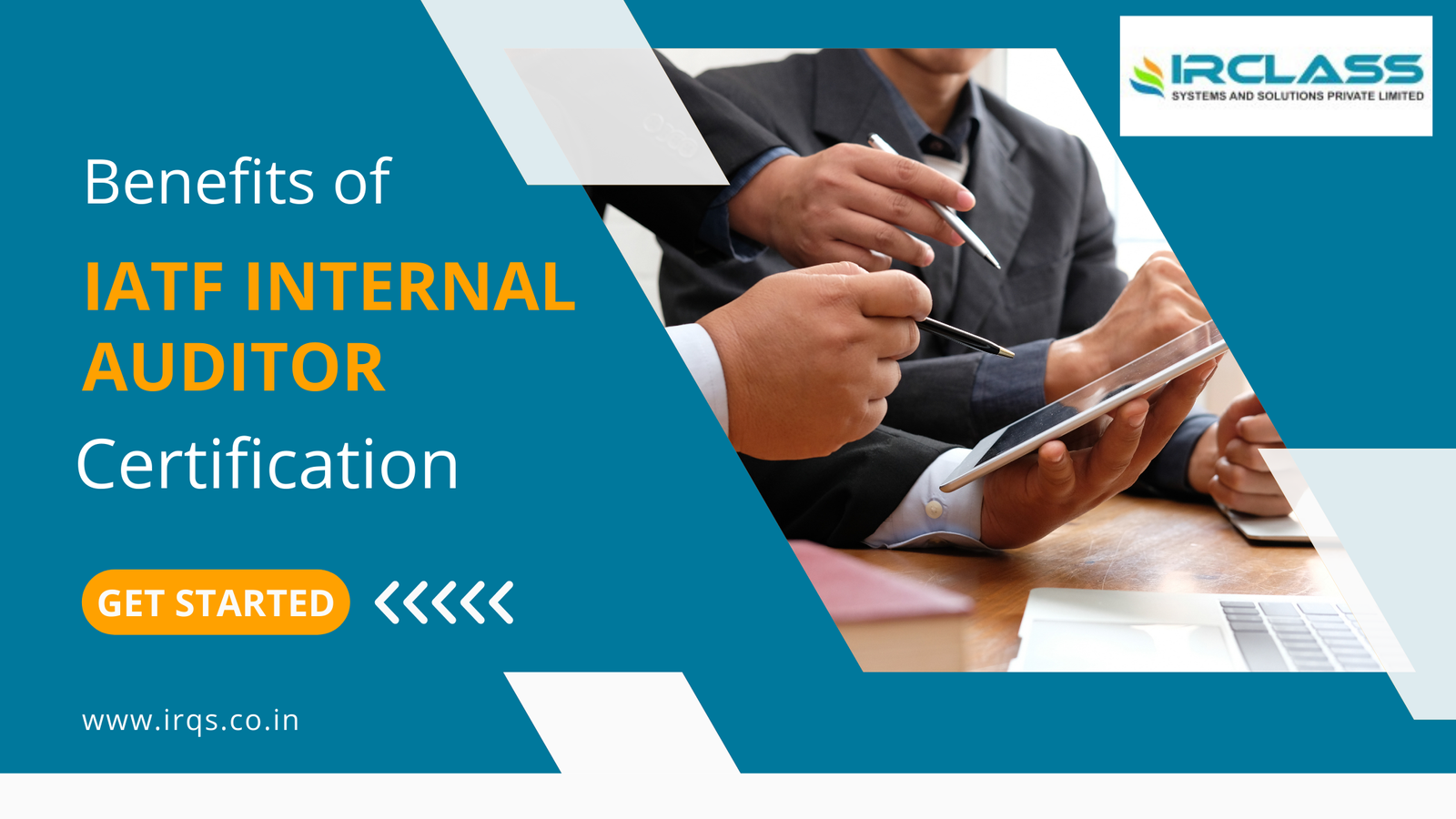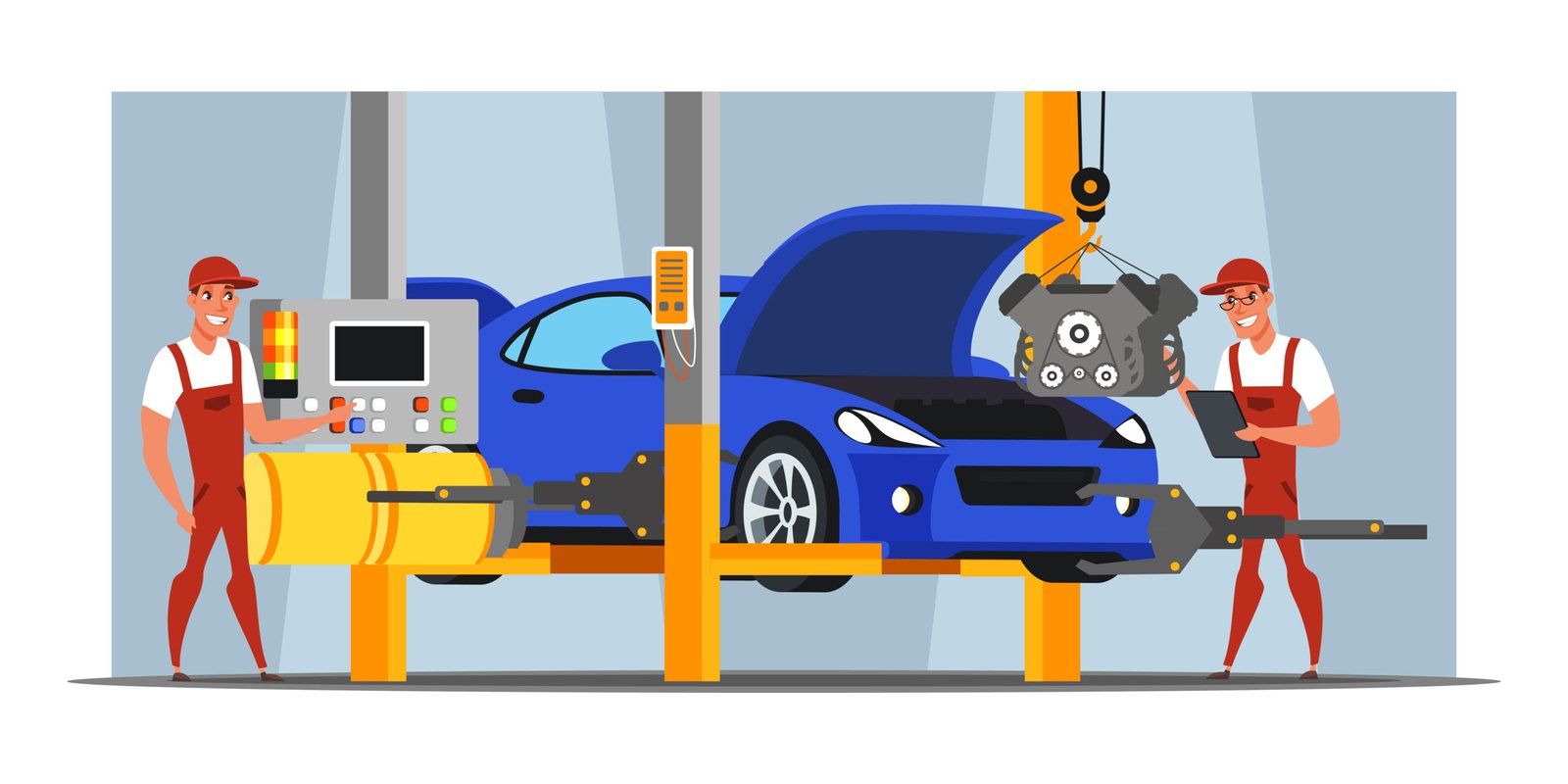Category: IATF 16949

The Benefits of IATF Internal Auditor Certification for Your Career
The Benefits of IATF Internal Auditor Certification for Your Career In the expansive field of quality assurance, you can achieve a rewarding career with suitable and advanced qualifications. The IATF is one such certification that you should obtain. Its full form is the International Automotive Task Force. With this certification, you can assist organizations to improve their Quality Management System (QMS) by becoming an IATF 16949 Lead Auditor. Also, you can apply your newly acquired knowledge in Automative Core Tools to benefit the company. Previously, it was ISO/TS 16949:2009 that met customer requirements. The upgrade focuses on risk evaluation and a more comprehensive approach, complying with the industry trends. A significant change is the certification now aligns with the ISO 9001:2015 standards. It enables the companies to flawlessly integrate the standards with other quality management systems in their business frameworks. How It Works The standard requires auditors to review and verify that automobile companies adhere to strict standards for quality management. The procedure for certification usually involves thorough education, passing an exam followed by a series of tests to show proficiency. When they have completed this process auditors show their capacity to assist organizations in meeting the international standards for automotive quality and ultimately lead to better products, greater customer satisfaction, and top-notch procedures. Requirements for Certification Benefits You Receive by Obtaining the Professional Certificate Enhanced Career Opportunities One of the most significant advantages of getting this certificate is the substantial increase in the opportunities for your profession. Since the auto industry is very competitive and quality-focused those who have this accreditation are sought after. Increased Knowledge and Skills You gain top skills like performing detailed audits, identifying violations, etc. The skills are highly transferable and could enhance your competence as a professional. Professional Credibility Possessing the IATF Auditor Certification adds value to your professional resume. It demonstrates to the public and your colleagues your expertise concerning compliance with the strict requirements of your industry and your skills for conducting efficient audits. Improved Company Performance You assist your company in identifying areas for efficiency, decreasing waste, and improving overall effectiveness. The results can be better product quality, greater satisfaction of customers, and excellent financial performance for your company. The work you do as a certified auditor could directly and positively influence the success of your company, and it will reflect positively on your job. Networking Opportunities Achieving and maintaining this certification could also increase your professional circle. Training and certification programs typically include interaction with professionals working in the field. It provides the opportunity to exchange knowledge about experiences, knowledge, and the most effective techniques. Keeping Current with the Latest Industry Trends The industry of automotive is continuously developing, with new techniques as well as regulations and quality standards constantly being introduced. Acquiring the IATF Internal Auditor Certification will help to keep you up-to-date with the most effective strategies. Personal and Professional Development Earning the certification is rigorous and requires a lot of dedication and commitment. The certification can be an essential source of happiness for professional and personal fronts. It shows your capacity to create and reach ambitious goals, increases your ability to solve problems, and increases confidence in the capabilities of your profession. Establishing and Maintaining Compliance As an auditor-certified, you assist your company in navigating the many complexities that come with standards and ensure that the procedures, documents, and processes comply with accepted standards. Improving the Work-Environment Audits conducted by internal auditors are essential in creating a quality culture in an organization. When employees are aware that their organization is committed to high standards and continually making improvements, it will boost motivation and enthusiasm. Being a certified internal auditor is essential in fostering a positive working environment. Facilitating Risk Management The IATF Standard 16949 focuses on risk-based thinking which is vital for recognizing the potential risk within an organization. As an internal auditor certified is certified to analyze risks that come in quality-related processes and implement strategies for managing those risks efficiently. Career Flexibility and Mobility The knowledge and skills gained by completing IATF Internal Auditor Certification IATF Certified Internal Auditor is highly transferable giving you more career flexibility and freedom. Contribution to Industry Standards Being an internal auditor certified you can contribute to the overall business by being involved in developing quality standards. The knowledge and experience gained from your hands will be invaluable in determining future revisions to the IATF Standard 16949 or any similar standards. Combining practical experience with theoretical Experience and Knowledge The Internal Auditor Certification procedure effectively balances the theoretical understanding with hands-on experience. Training programs offer in-depth knowledge regarding the IATF 16949 standard. In addition, the auditing requirements ensure that you can use these skills in actual situations. Combining theory with application gives you skills highly sought-after by companies. Developing a Strategic Mindset Internal auditing and Quality Management are not just about complying with procedures, they demand an underlying strategy. When you become an accredited internal auditor, you consider what quality management practices align with the organizational goals. Learn to look at the big picture and appreciate how quality management can ensure business performance. Conclusion The Internal Auditor Certification of the IATF has multiple benefits that will significantly affect your professional and career development. It can help you increase your opportunities for advancement and credibility in the workplace to promote constant improvement and create an environment of excellence within your business.

IATF 16949 vs ISO 9001: Understanding the Key Differences for Automotive Manufacturers
Many corporations employ more than one quality assurance program for optimal functionality. One requires maximized quality assurance for their production unit to guarantee top-grade products and services. It is critical for the automotive makes to meet the highest standards of quality and safety. The competition is growing at an incredible pace, and thus, ISO 9001 and IATF 16949 have become the go-to resource for manufacturing resources. ISO 9001 and IATF 16949 programs have similarities and differences. Recognize the prime distinctions between these two quality assurance programs. It will help you choose the ideal certification requirements for your business. ISO 9001 and IATF 16949 are the best-in-class quality assurance programs in the automotive industry. The certification program and quality assurance framework help organizations establish the critical standards, guidelines, and ideal practices related to manufacturing and supplying the highest quality products in the market. Both certification programs emphasize quality management. But there are prime aspects that make the certifications unique in their own ways. Identify the keyways and consider the prime aspects before choosing one over the other. Determine the ideal quality assurance program that can suit the best for your organization. Read on and learn more about ISO 9001 and IATF 16949 by highlighting their differences and similarities. Understanding ISO 9001 The International Organization for Standardization, or ISO, defines world-class standards for various quality control requirements. One can find the certification programs in 170 countries across the world. The ISO norms are suitable and applicable for food safety, product quality, manufacturing processes, management systems, and other environmental issues. An organization can acquire the certification through a third-party auditor. The certification confirms that the company adheres to the industry-specific quality requirements. This certification exhibits the reliability of the company. Quality assurance certifications for automotive companies are critical to ensure vehicle safety. There are various versions of ISO 9000, including – 9001, 9004, and 9002. For example, ISO 19000 focuses on the three fundamental elements of quality management. It includes people, processes, and end products. These principles are critical to assure product excellence. But these do not focus on improving the work environment. It is the prime reason IATF 16949 has become an extensive choice. It delivers a comprehensive solution. Understanding IATF 16949 IATF stands for International Automotive Task Force. The IATF 16949 certification defines the critical Vehicle Production Quality Management System Requirements. It got established by automakers more than ten years ago. The automotive manufacturers must conform to the safety norms and pass the quality inspections to receive certification under IATF 16949. It involves more than the conventional quality assurance measures. IATF 16949 focuses on the safety of the industrial plant and specifies the ideal techniques of automotive manufacturing. It covers everything from start to finish, including logistics. The International Automotive Task Force, or IATF, is a well-developed quality management system standard. It is an excellent choice for the automotive companies. The International Standard of Quality Management System Requirements for Production, Installation, and Maintenance of Vehicles was developed to regulate quality procedures across the world. Prime differences – ISO 9001 versus IATF 16949 Organizations can be certified to ISO 9001 and IATF 16949. A company can use its certification to exhibit its commitment to quality management and ensure continuous improvement in the automotive industry. Organizations that are exclusively certified to ISO 9001 can simplify the requirements and adhere to the evolved norms of IATF 16949 to promote better quality management. How? Because IATF 16949 certification depends on ISO 9001, easing the requirements to the next level. However, organizations not certified to ISO 9001 can still pursue certification to IATF 16949. In such a case, the organization must implement a competent and comprehensive quality management system that satisfies all the requirements of both standards. The penultimate difference between ISO 9001 and IATF 16949 is the approach. ISO 9001 is a general quality management system standard. It is not specific to the automotive industry. It contains the usual requirements applicable to all organizations. With IATF 16949 certification, one can meet the additional specific requirements for automotive suppliers. Recognize the ideal choice. The differences between ISO 9001 and IATF 16949 are diverse and numerous. The differences are related to the respective industries, including manufacturing and supply chain. ISO 9001 focuses exclusively on the internal quality processes. IATF 16949 focuses on the supplier quality management systems. ISO 9001 got published in 1987, and IATF got published in 2002. However, organization owners must consider both. Simply put, if you have the ISO 9001 certification, you should also consider IATF 16949. Selecting the ideal certification program that will work best for your company could be exhausting. Companies require the best quality management standard to stay in the competition. Hence, it is vital to identify the benefits. It will help you realize the best quality standard for industrial operation. Despite the differences of IATF 16949 vs. ISO 9001, identify the crucial benefits to make the best choice. a) Enhanced internal management b) Reduced waste for manufacturers c) Increased efficiency, operational productivity and ROI d) Enhanced employee engagement e) Better customer retention and acquisition f) Consistent improvement and performance measurement Make an informed choice. Recognize the perks of becoming certified to a quality management certification or lab standard. It must increase value to the organization and enhance the organizational operations to the next level.

IATF 16949 vs. ISO 9001: Key Differences and Transitioning Tips
Quality management systems or QMS are vital for organizations. The system is essential to ensure that the products and services follow and live up to the expectations of the customers and meet their requirements. Simply put, it exhibits if the products or services are of high quality. ISO 9001:2015 and IATF 16949:2016 are two extensively recognized standards for quality management. However, there are multiple differences. ISO 9001 is a generic QMS standard. It is apt for all industries and sectors. Find its application everywhere – from agriculture to manufacturing. The QMS is maintained by ISO. In contrast, the IATF 16949 reflects features that make it completely different. The AITF standard is maintained by the International Automotive Task Force. Even though there are differences between IATF 16949 and ISO 9001, the foundation is exclusive. It means both are built on the same foundation. For instance, a company in the automotive sector can implement both ISO 9001 requirements and IATF 16949-specific requirements. Objective – The prime difference ISO 9001:2015 is an all-inclusive quality management standard, and it can be applied to any type of organization. It is apt for all organizations, regardless of size, type, or industry. The quality management system outlines the fundamental requirements for developing, implementing, and maintaining a QMS. It ensures optimal focus on customer satisfaction, continual improvement, and engagement of stakeholders. IATF 16949:2016 certification comprises a specific quality management standard for the automotive industry. It is based on ISO 9001:2015. The IATF 16949:2016 certification includes additional requirements, suitable for the automotive industry. It covers critical aspects like – product traceability, production control measures and service provision, and dynamic customer-specific requirements. IATF 16949:2016 is ideal for automotive manufacturers and product suppliers. In fact, the certification is mandatory for those operating with OEMs or original equipment manufacturers in the automotive industry. Additional requirements – Marking the difference. Both ISO 9001:2015 and IATF 16949:2016 define the prime requirements for a QMS. But there is more. The IATF 16949:2016 certification comprises additional norms and requirements, specific to the automotive industry. The prime differences in requirements are – In a nutshell – A comprehensive overview There are multiple differences between IATF 16949 vs. ISO 9001. But there is more to explore. In fact, IATF 16949 is based on ISO 9001 norms, and it combines the dynamic ISO 9001 requirements. Both certifications offer integral benefits, including – a) Efficient internal management b) Reduced wastage in production c) Enhanced efficiency, productivity, and profits d) Optimal employee engagement e) Maximized customer retention and acquisition f) Consistent production quality Transition is a critical step – Explore the details. The transition from ISO 9001 to IATF certification norms is a step-by-step journey. Experts can help you through the transition. With them, identify the diverse benefits of the updated IATF 16949:2016. The essential aspects of the transition process 1. Obtain a fresh overview of your quality management system 2. Attend the transition training courses and recognize the prime differences 3. Recognize the prime changes to enjoy the diverse improvement opportunities 4. Ensure a well-documented system and obtain an overview of the additional requirements for the quality management standard 5. Implement new requirements on leadership, risk, and context of organization 6. Review the effectiveness of the current quality control system 7. Maintain an impact assessment case study to ease the needs A straightforward approach – Realize the essentials. Transferring the IATF 16949:2016 certification is an effortless solution once you realize the vital rules. One can consult an expert and review the certification body’s contractual terms and conditions. It will help you facilitate the transition process and understand the audit cancellation policies and fees. The quality assessment specialists and service team of experts ease the requirements, helping you navigate the needs for a fuss-free certification transition. ISO and IATF certifications – Explore the benefits. IATF certifications and ISO certifications necessitate optimal effort and commitment. It depends significantly on the manufacturer. Despite the critical steps, one must focus on the following aspects and avoid inconveniences. Closing advice Make a wise choice by considering expert assistance and smoothen the transition process for certification requirements. Ease the worries with the industry specialists and enjoy their professional assistance.

Demystifying IATF Certification: A Step-by-Step Guide for Automotive Suppliers
Demystifying IATF Certification: A Step-by-Step Guide for Automotive Suppliers IATF 16949 is the global standard for quality management systems specially designed for the automotive industry. The international standard for the automotive industry is based on ISO 9001. It was developed by the International Automotive Task Force (IATF), and the certification framework focuses on the distinctive requirements for quality assurance in the automotive industry. If your business or organization is part of the automotive sector, you must comply with the norms of IATF 16949. About the IATF certification – Know the facts. IATF 16949 was developed to correspond to the diverse regional and national automotive quality standards. These local and national standards had developed over the years, and there was no parity. Thus, the international quality standard for the automotive industry became an indispensable choice for the prime business owners and automakers. One can find four prime goals of the IATF 16949 framework – a) The essentiality to promote a common perspective is integral for the automotive quality management system b) It is vital to facilitate the compatibility of automotive quality management systems across the globe c) One must focus on enhancing customer satisfaction with updated products and services from the automotive industry d) It is critical to contribute comprehensively to the overall performance of the automotive industry globally Advantages of the IATF certification The IATF 16949 certification demonstrates the commitment of an organization to meet product and service quality alongside customer satisfaction in the automotive sector. There are multiple benefits of getting the IATF 16949 certification, including – a) Enhanced product quality b) Reduced scrap products and reworking expenditure c) Enhanced customer satisfaction d) Increased market value of products and services e) Boosted employee morale and motivation Credibility – A prime advantage of IATF Achieving the certification exhibits that the company can operate optimally with an efficient quality management system. It also reflects that the company adheres to the widely accepted quality standards of the automotive industry. IATF 16949 is an international standard that enhances automotive quality and widens the customer base for your organization. Amplify the quality standards and improve customer satisfaction by achieving the automotive manufacturing certification. Satiated customers can vouch for the safety and standard of the products, enhancing the organization’s reputation. Find a systematic approach with IATF certification and witness the diverse benefits of the integrated systematic processes. Resolve the best techniques to reduce redundancy and boost inefficiency with a systematic approach. With IATF 16949 certification, the organization managers do not have to feel dicey about their decisions. Ensure better decision-making with necessary data to formulate business quality maintenance policies and operational procedures. Continual improvement is a critical aspect related to IATF 16949. Cost savings and continuous improvement in quality maintenance processes boost organizational productivity to the next level. Engaged employees can generate a positive impact on the organizational performance. They can recognize their roles and the significance of their professional duties. Getting the IATF certification – There are different steps to get certified, and one needs to focus on every step with maximum care. Read on and know better – Stepwise process for the IATF certification Apart from recognizing the formalities and stepwise approach for the certification, you must understand the ideal organization approach. It will help you manage everything conveniently and streamline the process. IATF Certification maintenance – Know it rightly IATF 16949 certification is not a one-time solution, and you must understand the certification maintenance requirements. Companies must monitor and improve the quality management system continually and ensure certification compliance. Regular surveillance audits can be the best choice. Maintaining the norms is critical for the following long-term benefits – Get the best professional assistants. Find the ultimate audit-based assistance from the trained professionals of IRQS and make the best choice for your automotive business. The experts can bring their expertise to streamline the audit process and deliver an efficient solution for your business requirements and audit compliance.
5 Common IATF Certification Myths Busted – What You Need To Know
Discover The Truth Behind Misconceptions About IATF Certification, Ensuring Accurate Insights For A Successful Automotive Journey. IATF 16949 is a well-known global technical specification. It is a quality management standard that specifically focuses on the automotive industry. IATF 16949 is an enhanced version of ISO 9001:2015. The ISO framework is comprehensive and contains supplemental specifics apt for the automotive industry. It is not a stand-alone QMS. The automotive quality experts have used their decades of experience working in the automotive industry and vouched for the effectiveness of the framework. The experienced automotive quality experts have integrated the critical information and essential steps for preparing the IATF 16949 certification. One can extensively dive into the IATF 16949 standard objectives and explore the benefits of certification. According to experts, the certification is advantageous for companies in the automotive industry. One can overcome the potential challenges and utilize valuable resources to ease the journey toward certification. Learn the vital aspects related to the certification and bust the myths for a clarified overview. The essentiality of QMS – Resolve the doubts and bust the myths. The quality management system, or QMS, is an integrated collection of essential policies, procedures, documentation, and records. The process and documentation define the necessary set of internal rules. It exhibits how your company formulates and delivers the product or service to the customers. The QMS of IATF 16949 is tailored to the needs of a company in the automotive industry. Hence it is beneficial for more than one aspect. Read on and obtain an overview of the common myths for enhanced knowledge. Myth one – It is not so significant! IATF 16949 offers a global technical specification and comprehensive quality management standard for the automotive industry. Therefore, it is extensively significant for companies in the industrial sector. The ISO framework delivers an industry-specific standard from across Europe and the U.S., defining everything you need for incorporating the best practice while formulating, manufacturing, installing, or maintaining automotive products. It is an effective resource for organizations of any size and can be used by any company. The international standard helps create a system ensuring optimal customer satisfaction and improvement. Myth two – It is a complicated QMS! The IATF 16949 structure is not at all complicated. In fact, it is split into 11 sections. The first four sections are introductory, helping you decode the essentials. The last seven contain the essentials for the quality management system. There are more sections, and each clause defines the needs. One can find an efficient QMS based on a Plan-Do-Check-Act cycle. With well-defined clauses, one can implement and maintain the QMS process diligently. Myth three – It is not beneficial for you! The leading automotive manufacturers and OEMs consider the QMS insights provided by the ISO framework. The promising benefits of an IATF 16949 certification help you obtain a comprehensive overview. The IATF 16949 certification exhibits that a company has an efficient quality management system with the requirements that help maintain and boost the continual improvement phase. IATF 16949 certification also boosts customer satisfaction by emphasizing the fault management and prevention system. All these facilitate the reduction rate of waste in the supply chain. Myth four – It does not have a role in business and profits. Companies can conveniently adapt the approach of IATF 16949 and ensure optimal profit. How? Because it enhances individual processes in an organization and focuses on overall development. Applying the framework boosts the interactions of the individual processes. By following the framework, one can access the areas for improvement and recognize the resources within the organization. Avoid making wrong decisions with the efficient QMS and ensure profitability. Facilitate the process of making decisions by relying on the specifications defined by IATF 16949 QMS. Thus, it has a prominent role in utilizing the target resources. Use the specifics to rectify the organizational issues for operation and improve the overall efficiency and effectiveness. Myth five – There are no differences between ISO 9001 and IATF 16949 There are differences between ISO 9001 and IATF 16949. ISO 9001 defines the elementary needs of a quality management system for all kinds of organizations. In contrast, the IATF 16949 deals with the requirements of QMS for organizations in the automotive industry. The ISO 9001 is a stand-alone document, but the IATF 16949 needs to be implemented as an extended version of ISO 9001:2015. The framework of IATF 16949 is apt for organizations operating in the field of production and maintenance of aftermarket parts. One can also focus on the customer-specific requirements with IATF 16949. Therefore, you can spot the prominent differences between the two ISO frameworks, and it would be wrong to consider these as similar solutions for organizations. Concluding note Now you know the conventional myths related to IATF 16949. Make the best choice with an informed approach. Everything depends on the techniques followed by the organization and the expert assistance. You can connect to IRQS for an enhanced and accurate audit service. Get end-to-end and efficient audits to resolve the complexities. Make a prudent choice by recognizing the critical facts related to IATF 16949 and ease the needs. Image by rawpixel.com

Understanding The Benefits Of IATF 16949 Certification For Automotive Manufacturers
The ever-rising competition in the automotive industry compels you to make the best choice for sustaining the market position. Every customer needs assurance about the quality. They demand consistent grade maintenance in production and higher quality components with reduced wastage. Automotive brands need to cope with the demands, and thus IATF 16949 has become the apt choice. An overview of IATF 16949 IATF 16949 is a well-known certification offering a definitive framework specially designed to meet customer essentials. It works perfectly by developing a quality management system QMS with systematic processes, enhanced customer satisfaction, and continual improvement for automotive component production. IATF 16949:2016 is the international quality standard suitable for the automotive industry. IATF 16949 was developed by the International Automotive Task Force. IATF 16949 is an extension of ISO 9001, but the impact of IATF 16949 goes beyond the elementary steps of standardization and quality maintenance. Simply put, it delivers a tailor-made approach to meeting customer-specific requirements for all the automakers in the industry. The focusing aspects of IATF 16949 IATF 16949 certification yields more than one advantage for automotive suppliers. They have to focus, implement and make the necessary investments to ensure the best automotive QMS. The benefits of IATF 16949 certification for the automotive industry include the following – Benefits that make it the apt choice The focusing areas of IATF 16949 could also be passed as the prime benefits of the certification. IATF 16949 delivers more than one benefit for an organization. 16949 quality management system impact significantly in the core operations, sales, and customer satisfaction aspects of the industry. Read on and get an overview of the benefits that make a difference. IATF 16949 is a well-recognized standard, and in recent times, it has become the benchmark for developing a competent Quality Management System or QMS. It is a significant part of the automotive industry around the globe. When a customer reviews a supplier, the certification becomes a critical determinator. A QMS based on IATF 16949 helps you sustain the high competition in the automotive industry. It is a substantial benefit for companies and it compels most of the brands to get registered with IATF 16949. Most automotive manufacturers and suppliers across the globe need to focus on implementing IATF 16949, facilitating the process of pursuing business. IATF 16949 is a global standard certification, and the automotive quality standard determines the variation in your customer base and client companies worldwide. A streamlined operation and QMS with processes under systematic control yield financial rewards in return for the investment in implementing QMS. Usually, the QMS-certified companies reflect better numbers in terms of monetary performance compared to the uncertified brands. Many organizations implement the best practices for QMS and IATF 16949 framework to assure customers about the enhanced Quality Management System or QMS in the automotive manufacturing company. An organization with an effective and well-operational QMS suffice customer expectations compared to an organization with no definitive framework for QMS. One can focus on the objectives and goals of the operation with the best steps. Customers must also feel involved, and thus, customer feedback plays a vital role. It gets analyzed for incorporating the best steps. Another critical benefit of the enhanced QMS or quality management principle of IATF 16949 is facilitating the process of evidence-based decision-making. Businesses can drive their decisions better with a regulatory QMS framework, based on factual data. It helps organizations focus on utilizing and employing resources in substantial areas with the potential to ensure maximized improvement, streamlined processing, and production effectiveness. Additionally, the organization can also take one step forward and monitor the process improvement via actual data-based references. Continual improvement is another vital quality management principle of IATF 16949. Automotive companies can focus on improving processes, productional efficiencies, and cost savings. In the long run, it ensures continual improvement, for the companies, and the return is always on the higher side. A professional culture of continual improvement yields benefits for the upcoming years. With the specialized and systematic process approach, IATF 16949 certification offers the finest benefits uniting well-defined processes with higher efficiencies. If the employees at an organization get extensively involved in the improvements of the QMS and processes, they engage themselves more. It facilitates the areas of improvement with the optimal utilization of resources. Employees with a streamlined mindset are more productive. They assist the companies, to improve and how! Thus, the organization ensures steady success via a strong employee and customer base. The international standard, IATF 16949, is based on ISO 9001:2008, with a specialized approach to the industry. It promotes a processed and systematic approach. One can utilize the process approach, and augment the understanding of the inter-relationship. It facilitates the QMS process and avoids problems in the supply chain as well. If your organization gets certified to ISO 9001, implementing IATF 16949 is a piece of cake. Follow the best steps for automotive QMS. Most automotive manufacturers need the IATF 16949 certification because it is globally recognized. It helps the brands become credible names on a global scale. IATF 16949 framework implementation develops a work atmosphere and enhanced operational process, open to feedback, idea collaboration, improved employee involvement, etc. The global standard brings critical information to organizations that help them understand the vital parts of the implementation. But, it does not explain the implementation process. As an organization, it depends on your approach. You have to define your QMS to meet the specific productional needs. Connect to IRQS for a systematic and flawless audit service. Get end-to-end and streamlined audits to avoid the complexities. Make the best choice for industrial accreditation by selecting the correct steps.

How Do I Become an IATF 16949 Auditor?
The IATF 16949 certification is concerned with the automotive industry. It is a globally acknowledged certification program for the automotive components quality management system. It is a joint development of the IATF or International Automotive Task Force and ISO (International Organization for Standardization). The role of an auditor is vital in more than one way. So, you need to follow systematic steps to get the professional title. What is IATF training? There are two types of training for IATF, one for the internal auditor and the other for the leading auditor role. The participants in the training process need to have an in-depth idea about the quality and management protocols and guidelines like ISO 9001. Through the training process, the participant gets prepared to meet the needs of IATF 16949 guidelines, customer expectations, etc. It is a comprehensive training through which the participants can recognize the crucial aspects of the IATF 16949 norms. Top Benefits of the IATF Certification – Perks of becoming an auditor FAQs – Resolving doubts. What is the timeline for getting the IATF 16949 auditor certification? The training for IATF 16949 auditor is short spanned and it takes only five days to complete the course. It provides knowledgeable exposure to aspirants who want to make a career in audit services for the automotive sector. The course offers in-depth training and at the end of five days, a final exam gets conducted by the training institution. What are the 10 clauses of IATF 16949? The ten significant clauses of the IATF 16949 certification include – What are the requirements of IATF 16949? The highest level of auditor training has a few requisites that you need to fulfill for getting the professional title. The first- and second-party auditors who aspire to become a QMS lead auditor, QMS auditor, or QMS lead auditor are the eligible ones. Besides these, anyone who wants to learn about the ISO IATF 16949 for conducting the automotive quality management system audit can undergo the training process for five days. Who is eligible for IATF certification? The course is ideally designed for internal and third-party auditor candidates. However, the eligibility norm also allows the quality assurance managers, IATF 16949 implementation and transition team members, and management representatives, from the automotive industry to undergo the training process. Anyone who aspires to develop competency in IATF 16949 and the professional auditing methods for conducting first, second-, and third-party auditing is eligible for the course. Choose IRQS for IATF 16949 Auditor Training Get certified by applying for the certification program and choose IRQS as the audit expert. Find quality learning resources for auditor training as well with IRQS. We conduct accurate ISO audits to report whether the company is suitable for qualifying the certification process.
Search
Useful Links
Recent Posts

5 Easy Steps to ISO Certification in Surat: Boost Your Business Today!

The IRQS Edge: What Sets Our ISO 9001 Training Apart from the Competition



